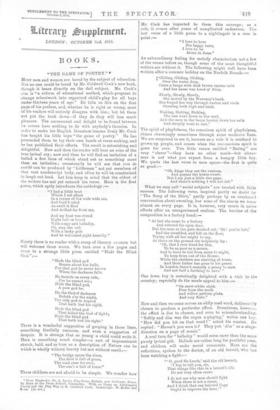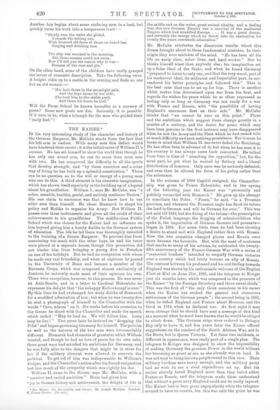BOOKS.
"THE GAME OF POETRY." *
MOST men and women are bored by the subject of education. But no one could be bored by Mr. Caldwell Cook's new book, • though it bears directly on the dull subject. Mr. Cook's . aim is "a reform of educational method, which proposes to change schoolwork into organized child's-play for all boys under thirteen years of age." He tells us this on the first page of his preface, and, whether he is right or wrong, most of his readers will entirely disagree with him ; but let them not put the book down—if they do they will lose much pleasure. The amusement and delight to be found between its covers have nothing to do with anybody's theories. In order to make his English literature lessons lively Mr. Cook has taught his little boys "the game of poetry." He has persuaded them to try their own hands at verse-making, and he has published their efforts. The result is astonishing and delightful. Now and then the reader will hear an echo of the true lyrical cry; now and then he will find an imitation of a ballad a few lines of which stand out as something more than an imitation ; occasionally he will see that vets de am:Re can be produced by " Littlemen " not yet members of that vast nondescript body, and often he will be constrained to laugh out loud. Let him keep in mind that the oldest of the writers has not yet entered his teens. Here is the first poem, which aptly introduces the anthology "I had a little boat
Which I set afloat
In a corner of the wide wide sea.
And loud I cried As swift it flied And drifted far from me.
And my boat was stored Right full on board With songs and balladry.
Oh, may she sail With a lucky gale And be welcomed right heartily."
Surely there is no reader with a scrap of literary acumen but will welcome these wares. We turn over a few pages and come to a strange little poem entitled "Hodr the Blind Goa
"Hodr the blind god
Roams about the halls, For that god he never knows When, the darkness falls.
He feeleth on every side, • For he cannot see ; Hodr the blind god, A poor god he.
Be the God of darkness Ruleth o'er the night, The only god in Asgard That bath lost his sight.
Hodr the blind god That killed the God of light; Hodr the blind god That bath lost his sight."
There is a wonderful suggestion of groping in these lines, something fearfully ominous, and even a suggestion of despair. It is strange that so young a child could write it. Here is something much simpler—is sort of impressionist sketch, bald, and as true as a description of Nature can be which is wholly without beauty but not without merit:—
" The bridge spans the river, The field is full of grass, The road runs for ever,
The sun's a ball of brass."
These children are not afraid to be simple. We wonder how
• Persil Playbooks: No. S. Lyrics, Play-Swsgs, Ballads, and LiiileThall Ri77108. By Boys of the Perse School, Cambridge. With an Essay on Littleman's Poetry and the Play Way by H. Caldwell Cook. Cambridge W. kreffer and
Jas. [4s. net.]
Mr. Cook has imparted to them this courage; as a rule, it comes after years of complicated endeavour. The last verse of a little poem to a :nightingale is a case in point
"I love to hear
His happy tune, I love to be • Alone in June."
An extraordinary feeling for melody characterizes not a few of the verses before us, though some of the most thoughtful writers are without it. The following might well have been written after a summer holiday on the Norfolk Broads Gliding, Gliding, Gliding, Over the water deep, Came a barge with dark brown canvas sails And her name was Land of Steep.
Slowly, Slowly, Slowly, She moved by the Waveney's bank.
She forged her way through rushes and reeds Growing both high and rank.
Sinking, Sinking, Sinking, The sun went down in the west, And the men in the barge hauled down her sails
And sleepily went to rest."
The spirit of playfulness, the conscious spirit of playfulness, shines charmingly sometimes through some mediocre lines. We are surprised to see it, because as a rule it is confined to grown-up people, and comes when the unconscious spirit is gone for ever. Two little verses entitled "Eating" are very "clever "—they have no other merit—but clever- ness is not what you expect from a hungry little boy. We quote the last verse to save space—the first is quite as good :—
"Oh, kings they eat the venison, And queens the honey sweet. But I am just a little wee page, And there's nothing I will not eat."
What we may call " social subjects " are treated with little success. The following verse, inspired partly no doubt by "The Song of the Shirt," partly perhaps by an overheard conversation about sweating, has none of the charm we tree almost on every page. It is, however, very comic in naïve efforts after an unexperienced realism. The heroine of the composition is a factory hand :— " At last she came to a factory And entered the open door, But the man at the gate shouted out, 'Hi ! you're late,' And she trembled, and fell on the floor, Trying with all her might to say, As there on the ground she helplessly lay :
'Oh, that I ever lived for this,
To be as poor as a mouse,
And to have to toil from morn to night,
To keep from out of the House; While the-children are starving at home, And their father has gone to his grave.
In London there's scarcely a penny to earn
And not half a farthing to save.'"
One town boy is ecstatically delighted vvith a visit to the country; especially do the meals appeal to him "On snow-white oloth Free from the moth And willow pattern plate. And rosy Kate."
Now and then we come across an oddly used word, deliberately chosen to produce a particular effect. Sometimes, however, the effect is due to chance, and oven to misunderstanding. "Softly and dim was the organ a-playing," writes one boy. "How did you bit on that word P " asked his master. Ile replied : "Haven't you seen it P They put 'dim' as a stage-
direction on a page of music." A‘real turn for " balladry " would seem rarer than the more purely lyrical gift. Ballads are rather long for youthful pens, and children will make moral comments. Here eve the reflections, spoken to the doctor, of an old hermit, who has been watching a fight :—
"‘ 0, good Sir Leech,' said the old hermit, beg to tell you, sir,
That things like this in a hermit's lifo Do not very often occur.
I do not see why men should fight When there is not a cause, And I think that our beloved liege • Ought to improve the laws." Another boy begins about some seafaring men in a boat, but quickly turns his work into a temperance tract :—
"Slowly over the water she glided,
Towards the setting sun, • With bronzed old faces of those on board her, Singing and drinking rum.
The ship wai wrecked in the morning,
But those seamen could not swim ; Now I'll tell you the reason why it was— Because of the rum and gin."
On the other hand, some of the children have really grasped thesecret of romantic description. Take the following verse. A knight rides up to a castle in the evening and finds no one but an old woman :—
" Her hair shone in the moonlight pale, And the keys shone by her side ; She took him to the stable yard, And there his horse he tied."
Will the Peree School be known hereafter as a nursery of poets ? Some new poets are due. Seriously, it is possible. If it were to be, what a triumph for the man who guided their "early feet "1















































 Previous page
Previous page